FRANKLIN D. ROOSEVELT AND THE ELECTION OF 1944
Written By: Joseph E. Moore, Esq.
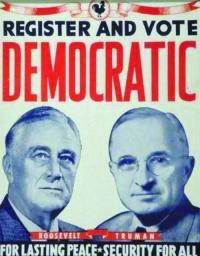
Roosevelt-Truman poster
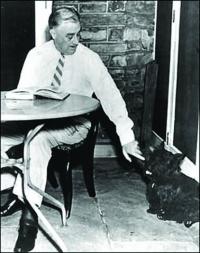
FDR with Fala at Warm Springs, Georgia.
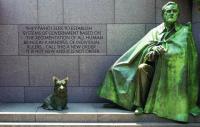
Franklin Delano Roosevelt Memorial, Washington D.C., with Fala (sculpture by Neil Estern).
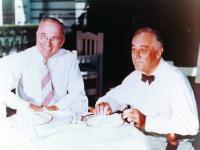
Roosevelt after Truman won the Democratic Vice-Presidential nomination at the Democratic National Convention, Aug., 1944.
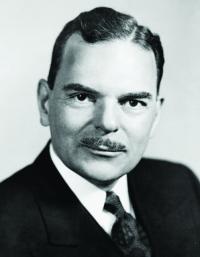
Governor Thomas E. Dewey of New York.
In the spring of 1944, President Franklin D. Roosevelt was a sick man. Far beyond his unprecedented break with tradition by running for his Third Term in 1940, he was, by far, the longest serving president in the history of the United States.
He was, however, just a shadow of his former robust (even though polio-stricken) self of the 1932, 1936 and 1940 campaigns. The strain of office and the terrible burden of a World War were definitely showing in his demeanor and appearance. And for the first time in 80 years the country was going through a presidential election during wartime. It would seem that the very nature of the conflict of war would give pause to potential candidates from the opposing Republican Party. This was not the case, however, by a long shot. Predominant among the possible candidates of the GOP was Wendell Willkie, the unsuccessful nominee of the party in 1940. Willkie was still a robust and active figure in the national scene, and clearly relished one more chance at the highest office in the land.
Although a commanding figure, he had become a man without a party. His outspoken personality and his world travels had isolated him from the party machine, and his blunt criticism of even those who opposed him in the Republican Party, left him no choice but to try to win primaries in order to secure the nomination.
Other potential names which surfaced were Harold Stassen, former Governor of Minnesota, now serving in the Pacific Theater of Operations as flag secretary to Admiral William "Bull" Halsey; General Douglas MacArthur (even though also serving in the South Pacific war zone) and Thomas E. Dewey, the Governor of New York.
Through a series of missteps, one by one the potential candidates were diminished in their respective quests. Willkie failed in his primary contests. MacArthur was caught red-handed making insubordinate remarks in response to a severely critical letter from a Nebraska Congressman which attacked the New Deal of the President. MacArthur intemperately responded that he was in complete agreement and hinted darkly at, "...the sinister drama of our present chaos and confusion". It is a wonder that he was not immediately removed from command by the Commander-in-Chief, but in wartime he could not yet be spared and his demise would await the heavy hand of Harry Truman in 1952.
Stassen, being in the war zone in uniform, could not mount an effective campaign, so there was left just one - Thomas E. Dewey. Dewey had a meteoric rise in National recognition. After graduating from Columbia Law School and a successful practice in a silk stocking New York Law Firm, he had been elected as District Attorney for New York County (Manhattan) where he gained fame by prosecuting "Legs" Diamond and "Lucky" Luciano. Narrowly losing a chance at Governor, he ran for the Republican Presidential nomination in 1940, though losing to Wendell Willkie. Two years later in 1942, he handily won the New York governorship. At age 42, he was on his way.
Dewey, however, was not flawless. His personality was stiff and formal, and his slick appearance with his pencil thin mustache and slicked back hair, lent themselves to jabbing remarks. Alice Roosevelt Longworth famously compared him to the "little man on the wedding cake" and a widely repeated remark was that you really had to get to know him well to dislike him.
Nevertheless, Dewey was the last man standing in the Republican nomination race, and won handily on the first ballot. In his acceptance speech, Dewey set the tone for the upcoming contest, by lambasting the Democrats for being, "...old and tired and stubborn and quarrelsome," and in office much too long.
So, Franklin Roosevelt was soon to be up to his neck in what would be recognized by all as his "Last Hurrah". There was no suspense at all about his determination to yet again seek re-election. Although he repeatedly said that he desired to return to his beloved estate at Hyde Park, New York, he was not going to shed the mantle of office during wartime. It was a job he considered essential to finish. As he put it, "If the people - the real Commander-in-Chief of us all...," ordered him to do so, he would, "...as a good soldier...," continue to serve.
Thus, the only drama in the Democratic nomination process was the selection of a Vice-Presidential running mate for Roosevelt. Coyly, he juggled several names: Henry Wallace, the out-of-step and unpopular Vice President; Justice William O. Douglas; Speaker of the House Sam Rayburn; Senators Alben Barkley and Harry Truman. In a bizarre twist, Roosevelt encouraged all of them and ostensibly left the decision up to the Convention delegates. In fact, the "smoke-filled room" deciding the matter was the President's own White House study, where all the names were vetted by the party bosses together with the Real Boss. Eventually, the focus came to Truman who had garnered a good bit of positive press in his honest and forthright handling of the issues of wartime supply and possible waste in management.
Finally, the word came to Truman that it was him and not Vice-President Wallace that the President really wanted. When he heard the facts, Truman replied, "Well, why in the hell didn't he tell me so?"
The candidates were set - Roosevelt and Truman for the Democrats and Dewey and Governor John W. Bricker of Ohio, a man, it was said, whose mind was a huge space with a few wandering clichés in it, but who was an attractive and popular running mate.
After the convention was over, Dewey continued his relentless attacks on the old, tired, and worn out White House. Roosevelt instinctively knew how he must respond. In the early years he relished the campaigns. "I am an old campaigner and I love a good fight!" he once said, but now his health was clearly an obstacle. So it was actions - not words - that would be required to bolster the confidence of the American people.
He set off on a Pacific trip to Hawaii to view landing exercises and the press would get the full view of a working President intent on winning the war. However, in his railroad car just at the beginning of the trip in California, he admitted to his son James, "Jimmy, I don't know if I can make it. I have horrible pains!" Nevertheless, he completed the trip. Upon his return, he insisted that an outdoor event be set up in the Seattle baseball stadium, and that was done. The President spoke in the open on a windy evening to thousands of folks present and to a nationwide radio audience; but unknown to his aides at the event, he suffered his first attack of angina pectoris. It would not be his last such attack. For about 15 minutes the pain gripped Roosevelt's chest and shoulders. But then the severe pain subsided. Nevertheless, the condition was reflected in Roosevelt's delivery of his remarks, and people began talking yet again as to whether the President had lost his touch.
And, of course, there was the War. Much of Roosevelt's time obviously was taken by the continuing strife. Although by 1944, things had turned in favor of the Allies, Germany and Japan were far from defeated. And the President also had the troublesome relationship with Stalin, and even a now grumbling Winston Churchill on world matters, including the possible makeup of the world at the end of conflict. He signed the GI Bill of Rights and proposed the formation of the United Nations, at the Dumbarton Oaks Conference, whish was disparaged by Dewey as, "...an effort to subjugate the nations of the world permanently to the coercive power of the Big Four".
In September, Roosevelt met with Churchill, at Quebec, with their respective military staffs to sharpen strategy in both the European and Asian theaters of War. Also discussed was the post-war role of Germany in Europe. After the conference Churchill again was the Roosevelts’ guest at Hyde Park.
In late September, a gala dinner was held at the new Statler Hotel in Washington, where union leaders, Democratic politicos and government officials were to meet. The keynote speaker was the President. The speech would be widely broadcast. There was an air of expectancy in the room, as lingering rumors of his health still dogged the President. After a rousing introduction, he began his remarks; and his daughter Anna Boettiger tentatively asked an aide, "Do you think Pa will put it over? If the delivery isn't right it will be an awful flop."
The expectant room quieted. Roosevelt began; "Well, here we are again - after four years. You know I am actually four years older, which is a fact that seems to annoy some people. In fact there are millions of people who are eleven years older than they were when we began to clean up the mess that was dumped in our laps in 1933!" The room burst into delighted laughter and applause.
Roosevelt was warmed up by now and proceeded to excoriate the Republicans and their campaign tactics and lauded his administration's efforts in the war. By this time, he had the crowd in the palm of his hand, as the room burst with applause and filled with laughter. But he wasn't finished...
"These Republican leaders have not been content with attacks - on me or my wife, or on my sons. No, not content with that, they now include my little dog, Fala. Well, of course, I don't resent attacks, and my family doesn't resent attacks, but ...Fala does resent them."
"You know - you know, Fala's Scotch, and being a Scottie, as soon as he learned that the Republican fiction writers, in Congress and out, had concocted a story that I had left him behind on an Aleutian Island and had sent a destroyer back to find him - at a cost to the taxpayers of two or three or eight or twenty million dollars - his Scotch soul was furious. He has not been the same dog since!"
Indeed, the "old campaigner" was back and in fine form! The effect was instantaneous, and Dewey felt it keenly. Although he characterized it as a “snide" speech, it struck a chord that couldn't be denied.
In a successive campaign trip, the President's big, open Packard delivered him to a speech in the rain at Ebbets Field in Brooklyn and then in a long motorcade from Queens to mid-Manhattan and then down Broadway. In the relentless rain, Roosevelt rode in the open car, with his great grin, waving his hat, and soaking his suit and shirt. After drying off in his apartment, he made a speech at the Waldorf Astoria where he attacked, with alliteration, the Republican Congressional trio of "Marton, Barton and Fish".
The day had been a singular success, and provided an unequivocal answer to the question of health and stamina. A week later he campaigned in another open car in Philadelphia, and a few days later at an outdoor meeting in Chicago, where 100,000 people packed Soldier Field.
While the President scored triumph after triumph, Dewey struggled to come to grips with his opponent. So, he reverted to his old ways as a prosecutor and brought out a new “Red Herring” - of the Democrats selling out to the Communists - which he said were taking charge of the New Deal.
Roosevelt genuinely disliked Dewey and he showed it. He now pushed back with icy contempt for Dewey's accusations saying that Dewey would like to create a "Monarchy" in the country. The campaign was coming to a close.
On the night before Election Day, as was his habit, Roosevelt adjourned to Hyde Park where, the next day, November 7, 1944, he voted and then awaited election results, which were predicted to be close. That evening by 11:00 p.m., the traditional torchlight procession arrived at Hyde Park where the Roosevelts were serenaded by all the townsfolk. Although his smallest margin of victory was the result, Roosevelt had won by more than 3,500,000 votes, receiving 25,612,916 to Dewey's 22,017.929. His Electoral College margin was 435 to 99. Dewey carried only 12 states. Nevertheless, he did not concede until 3:00 a.m., with a statement to the press, but with no customary call to the victor. As Roosevelt went up to bed, he turned to an aide and said, "I still think he is a son-of-a-bitch".
Five months and one week later, on April 12, 1945, Franklin D. Roosevelt was dead, felled by a cerebral hemorrhage, and Harry Truman was President.
[For further reading; James MacGregor Burns, ROOSEVELT, The Soldier of Freedom 1940-1945; and David M. Jordan, FDR DEWEY and the Election of 1944]
NEXT: BUDAPEST
«Go back to the previous page.




